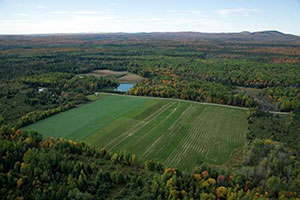In their opposition to GMOs, organic farmers point to the possible contamination of their crops. The use of the word contamination in itself is hyperbole and note the qualifier, possible. What they mean is cross-pollination, a less scary sounding word. Their vocabulary is full of maybes, could happens, and what ifs?
Organic farmers seem to be feel everything modern is a threat to their crops and it doesn’t even have to be that modern. Conventional farming, large-scale farming, the Moops. Everything seems to be a threat organic farming including food safety rules.
He and other organic farmers say stricter food-safety regulations, developed after a cluster of outbreaks of bacterial contamination in spinach and lettuce in 2006, threaten the principles upon which their farms are based.
If your principles are at odds with food safety, perhaps you might want to re-think your principles.
The Organic Seed Trade Association (OSGATA) lawsuit against Monsanto is a classic example of paranoid what if thinking. They sued to have Monsanto promise not to sue organic farmers if their crops get contaminated from neighboring gmo fields. They admitted in court filings that it hasn’t happened yet, but it might happen.
Monsanto, in response, offered up the reasoning that why would they sue someone who isn’t using, and has no use for their seeds?
Here is an aerial view of the lead plaintiff Jim Gerritson’s, organic farm taken from their site. Where is this contamination going to come from? Is Monsanto going to fly over his farm in planes dropping seeds so they can sue him?
Last year, a federal court dismissed the suit. It is currently under appeal.
The latest threat to organic farms comes to us from Shoreham, Vermont. Raj Bhatka, is a kind of unlikable guy who was fired from the Trump reality show The Apprentice and ran an unsuccessful campaign for Congress. He built a rye whiskey bottling plant, Whistle Pig on some farmland and wants to start distilling his own rye whiskey and his organic farming neighbors are against it. They, you guessed it, feel the distillery might be a threat to their crops.
WCAX.com reports:
Bhatka’s neighbors, George Gross and Barbara Wilson, who own a small organic berry farm called Solar Haven Farm, have voiced concerns about potential traffic, noise and black fungal growth or BFG, which can be produced from ethanol in the fermentation and whiskey-aging process.
“We believe the ethanol could be a potential source [my emphasis] of mold on our crop,” Gross said.
The article says that both sides have spent tens of thousands of dollars in this booze fueled fight. Bhatka says he’s not a rich guy and that “In an attempt to work through the rules, there are ample loopholes for malcontent and slightly insane neighbors with a budget to slow things down.”
His neighbors claim they are not trying to stop him just to ensure he follows the rules. George Gross claims they are not trying to queer his deal. “It’s not our intention to stop WhistlePig. We want them to be compliant with the law and respect the community and neighbors they have.”
When Gross refers to the community and neighbors, he is referring specifically to his farm. The town Selectmen have no problem with Bhatka. And seemingly, neither do most people in the area.
The aptly named Geoff Green, Environmental Commission coordinator for the area said, “Even a whiskey distillery can have potential big impacts on the environment and that’s what it’s all about.”
The angle the Gross’ are using is to claim that Bhatka’s business has been running for two years without a Act 250 permit which is required since his business is not considered a farm. According to state law, to be considered a farm, 50% of the ingredients have to be grown on the farm. Since the state says the whiskey’s main ingredient is water they don’t qualify, even though they grow rye for their whiskey, organic rye no less.
Organic farming seems to be the Boy in the Bubble of agriculture. Organic farmers are always complaining about threats to their method of farming; and that’s what it is, a method. If organic farming is so fragile, how on earth do they think it is a viable and sustainable way of farming?

Your concluding statement: if organic is so fragile, how on earth do they think it is a viable and sustainable way of farming, is brilliant. I’ve been thinking along those same lines, obviously, not quite as fluidly and well-written as you have. If everything and anything we do is a threat to organic farming, then surely, should our modern agriculture go out the window, nature herself would have her own scourges and pestilence to throw upon it!